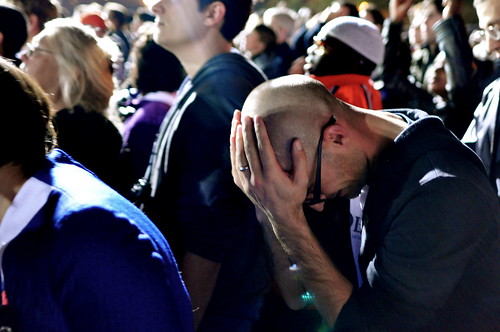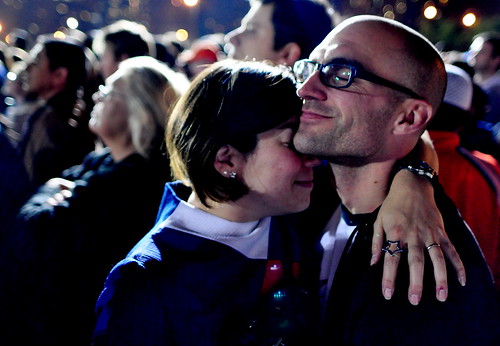First, he defended the use of the filibuster. The strategy of civil rights advocates, he said, "calls for depriving one minority of its rights in order to extend rights to other minorities." The minority that would be deprived, he explained, was the South.It's hard to read this, to read Johnson's perversions of the concepts of "minority," "majority," "freedom," and--against the background of the 5,000 lynchings of black men and women that happened between the Civil War and 1960--"deadliest weapon" and not feel your stomach turn. This is one of the definitions of evil: to turn values on their head and enlist them in support of the opposite of their meaning, then to stand on pointless principle and thus condemn actual people to violence and death.
"We of the South who speak here are accused of prejudice," Lyndon Johnson said. "We are labeled in the folklore of American tradition as a prejudiced minority." But, he said, "prejudice is not a minority affliction: prejudice is most wicked and most harmful as a majority ailment, directed against minority groups." The present debate proved that, he said. "Prejudice, I think, has inflamed a majority outside the Senate against those of us who speak now, exaggerating the evil and intent of the filibuster. Until we are free of prejudice there will be a place in our system for the filibuster--for the filibuster is the last defense of reason, the sole defense of minorities who might be victimized by prejudice." "Unlimited debate is a check on rash action," he said, "an essential safeguard against executive authority"--"the keystone of all other freedoms." And therefore cloture--this cloture which "we of the South" were fighting--is "the deadliest weapon in the arsenal of parliamentary procedures." By using it, a majority can do as it wishes--"against this, a minority has no defense."
The greatest achievement of Caro's biography is that it allows us to simultaneously grasp that Johnson--seemingly irreedemable--and the Johnson who would, through his pushing through of the Civil Rights Act of 1957, the first successful civil rights bill in nearly a century, and the Civil Rights Act of 1964, do more for black Americans, and for America's ideal of equality in general, than any elected official other than Lincoln. Caro makes a convincing case that no one but LBJ could have gotten those bills passed. Does the latter achievement outweigh the former disgrace? Yes, in my book, but good god, how that early speech burns despite.
By contrast, let's look at Caro's account of Hubert Humphrey's impassioned speech to the 1948 Democratic National Convention that won a civil rights plank in the party platform (and, in the process, had the salutary effect of driving out part of the segregationist old guard to form the short-lived Dixiecrat party):
For once his speech was short--only eight minutes long, in fact, only thirty-seven sentences.Humphrey's speech took conviction and courage, unquestionably, and he should be honored for that--but they were mere political conviction, political courage. Political courage gets praised frequently, in part because of its rarity, in part because we want to encourage it, and in part because reporters and columnists, enmeshed in a world where defeat in an election equates to death, confuse it with the real thing.
And by the time Hubert Humphrey was halfway through those sentences, his head tilted back, his jaw thrust out, his upraised right hand clenched into a fist, the audience was cheering every one--even before he reached the climax, and said, his voice ringing across the hall, "To those who say that we are rushing this issue of civil rights--I say to them, we are one hundred and seventy-two years late.
"To those who say this bill is an infringement on states' rights, I say this--the time has arrived in America. The time has arrived for the Democratic party to get out of the shadow of states' rights and walk forthrightly into the bright sunshine of human rights."
"People," Hubert Humphrey cried, in a phrase that just burst out of him; it was not in the written text. "People! Human beings!--this is the issue of the twentieth century." "In these times of world economic, political and spiritual--above all, spiritual--crisis, we cannot and we must not turn back from the path so plainly before us. That path has already led us through many valleys of the shadows of death. Now is the time to recall those who were left on the path of American freedom. Our land is now, more than ever before, the last best hope on earth. I know that we can--know that we shall--begin here the fuller and richer realization of that hope--that promise--of a land where men are truly free and equal."
For the real thing, we'll turn to Montgomery, Alabama on the night of January 30, 1956, during the Montgomery bus boycott. Reverend Martin Luther King was speaking at that evening's mass meeting at a church when word was brought to him that his house had been bombed. Taylor Branch, in Parting the Waters, describes King's response:
"Are Coretta and the baby all right?"Caro describes the scene outside King's house when he arrived:
"We are checking on that now," said a miserable [Ralph] Abernathy, who had wanted to have the answer before telling King.
In shock, King remained calm, coasting almost automatically on the emotional overload of the past few days. Nodding to Abernathy and [S. S.] Seay, he walked back to the center of the church, told the crowd what had happened, told them he had to leave and that they should all go home quietly and peacefully, and then, leaving a few shrieks and a thousand gasps behind, walked swiftly out a side door of the church.
In front of King's home was a barricade of white policemen shouting to a huge crowd, a black crowd, to disperse, but the men in the crowd, yelling in rage, were brandishing guns and knives, and teenage boys were breaking bottles so that they would have weapons in their hands.Inside, King found his wife and daughter alive and unharmed. Then he returned to his broken front porch, and, Branch writes,
Holding up his hand for silence, he tried to still the anger by speaking with an exaggerated peacefulness in his voice. Everything was all right, he said. "Don't get panicky. Don't do anything panicky. Don't get your weapons. If you have weapons, take them home. He who lives by the sword will perish by the sword. Remember that is what Jesus said. We are not advocating violence. We want to love our enemies. I want you to love our enemies. Be good to them. This is what we must live by. We must meet hate with love." By then the crowd of several hundred people had quieted to silence, and feeling welled up in King to an oration. "I did not start this boycott," he said. "I was asked by you to serve as your spokesman. I want it to be known the length and breadth of this land that if I am stopped, this movement will not stop. If I am stopped, our work will not stop. For what we are doing is right. What we are doing is just. And God is with us."In the just world that King envisioned, and worked so hard and gave his life trying to bring into being, he would have been eighty-three now.
In the just world that King envisioned, Emmett Till would have been seventy-one today.



